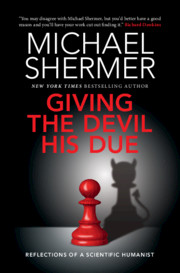Book contents
- Giving the Devil His Due
- Giving the Devil His Due
- Copyright page
- Dedication
- Contents
- Acknowledgments
- Introduction Who Is the Devil and What Is He Due?
- Part I The Advocatus Diaboli: Reflections on Free Thought and Free Speech
- Part II Homo Religiosus: Reflections on God and Religion
- Chapter 7 E Pluribus Unum for All Faiths and for None
- Chapter 8 Atheism and Liberty
- Chapter 9 The Curious Case of Scientology
- Chapter 10 Does the Universe Have a Purpose?
- Chapter 11 Why Is There Something Rather Than Nothing?
- Part III Deferred Dreams: Reflections on Politics and Society
- Part IV Scientia Humanitatis: Reflections on Scientific Humanism
- Part V Transcendent Thinkers: Reflections on Controversial Intellectuals
- Notes
- Index
Chapter 9 - The Curious Case of Scientology
Is It a Religion or a Cult?
from Part II - Homo Religiosus: Reflections on God and Religion
Published online by Cambridge University Press: 28 February 2020
- Giving the Devil His Due
- Giving the Devil His Due
- Copyright page
- Dedication
- Contents
- Acknowledgments
- Introduction Who Is the Devil and What Is He Due?
- Part I The Advocatus Diaboli: Reflections on Free Thought and Free Speech
- Part II Homo Religiosus: Reflections on God and Religion
- Chapter 7 E Pluribus Unum for All Faiths and for None
- Chapter 8 Atheism and Liberty
- Chapter 9 The Curious Case of Scientology
- Chapter 10 Does the Universe Have a Purpose?
- Chapter 11 Why Is There Something Rather Than Nothing?
- Part III Deferred Dreams: Reflections on Politics and Society
- Part IV Scientia Humanitatis: Reflections on Scientific Humanism
- Part V Transcendent Thinkers: Reflections on Controversial Intellectuals
- Notes
- Index
Summary
The first section of this article was inspired by the publication of two new books on Scientology: Janet Reitman’s Inside Scientology and Hugh Urban’s The Church of Scientology. After the publication of these works the floodgates were opened, with Tony Ortega’s The Unbreakable Miss Lovely, Lawrence Wright’s Going Clear, all exposing the abuses of the church in graphic detail. These were followed by insider tell-alls by Jenna Miscavige Hill, Beyond Belief, and by Ron Miscavige, Ruthless – the niece and father of the current head of Scientology, David Miscavige. Most revealing was the 2016 memoir by ex-Scientologist and Hollywood star Leah Remini, Troublemaker, followed by her A&E series, Scientology and the Aftermath. The second section was originally published as an opinion editorial in the Los Angeles Times in February of 2008, when Scientology was under public attack by a group calling itself Anonymous, which I found to be problematic, imagining what would have happened if a similar anonymous group attacked Jews, and why most of us would find that offensive. The third section is my brief response to the critics of the LA Times op-ed, primarily a historian of religion who upbraided me for using the pejorative term “cult” instead of the scholarly descriptor “New Religious Movement.” I think the shorter lemma fits.
Keywords
- Type
- Chapter
- Information
- Giving the Devil his DueReflections of a Scientific Humanist, pp. 93 - 102Publisher: Cambridge University PressPrint publication year: 2020

